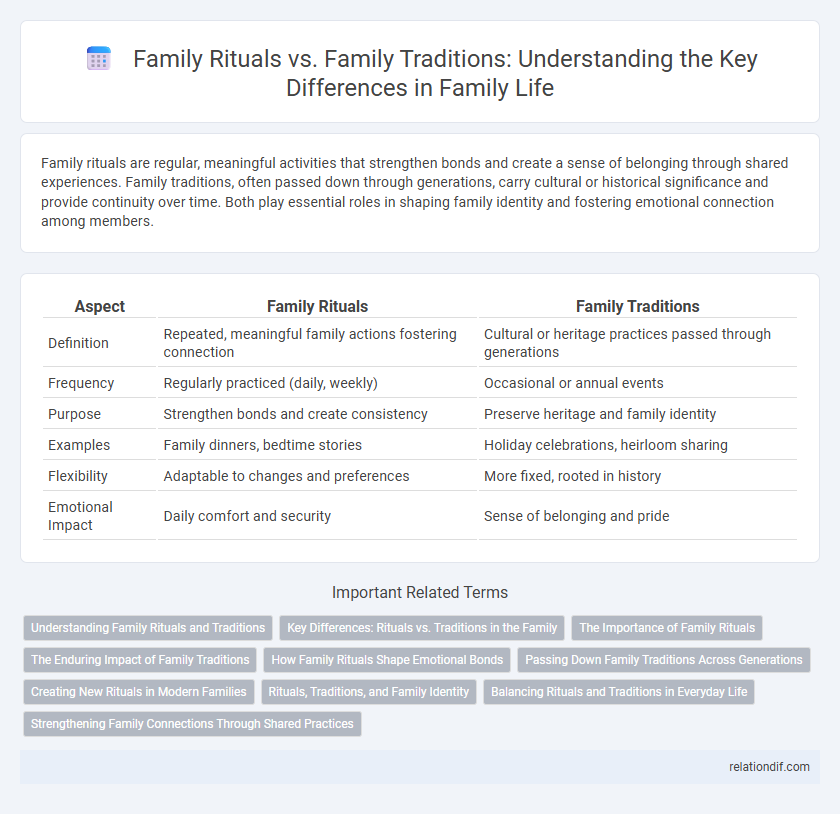Family rituals are regular, meaningful activities that strengthen bonds and create a sense of belonging through shared experiences. Family traditions, often passed down through generations, carry cultural or historical significance and provide continuity over time. Both play essential roles in shaping family identity and fostering emotional connection among members.
Table of Comparison
| Aspect | Family Rituals | Family Traditions |
|---|---|---|
| Definition | Repeated, meaningful family actions fostering connection | Cultural or heritage practices passed through generations |
| Frequency | Regularly practiced (daily, weekly) | Occasional or annual events |
| Purpose | Strengthen bonds and create consistency | Preserve heritage and family identity |
| Examples | Family dinners, bedtime stories | Holiday celebrations, heirloom sharing |
| Flexibility | Adaptable to changes and preferences | More fixed, rooted in history |
| Emotional Impact | Daily comfort and security | Sense of belonging and pride |
Understanding Family Rituals and Traditions
Family rituals are structured, repetitive actions that reinforce relationships and create a sense of security, while family traditions are broader customs passed down through generations that embody shared values and cultural heritage. Rituals such as weekly dinners or bedtime stories offer predictability and strengthen emotional bonds, whereas traditions like holiday celebrations or annual reunions provide identity and continuity. Understanding the distinction helps families intentionally cultivate meaningful practices that foster connection and preserve their unique legacy.
Key Differences: Rituals vs. Traditions in the Family
Family rituals consist of repeated actions with symbolic meaning, performed regularly to reinforce emotional bonds and shared values. Family traditions encompass broader cultural practices passed down through generations, often linked to holidays or significant milestones. While rituals emphasize consistent participation and specific behaviors, traditions highlight heritage and collective identity across time.
The Importance of Family Rituals
Family rituals strengthen emotional bonds by creating consistent and meaningful interactions that foster a sense of security and belonging. Unlike family traditions, which often emphasize historical or cultural practices, rituals focus on daily or regular activities that promote communication and shared values. Research shows that families practicing regular rituals experience higher levels of emotional resilience and stronger interpersonal connections among members.
The Enduring Impact of Family Traditions
Family traditions create lasting bonds by reinforcing shared values and cultural identity through repeated, meaningful activities. These rituals serve as emotional anchors during times of change and uncertainty, fostering resilience and a sense of belonging across generations. The enduring impact of family traditions strengthens relationships and shapes individual identities within the family unit.
How Family Rituals Shape Emotional Bonds
Family rituals, such as shared mealtimes and bedtime stories, create consistent opportunities for emotional connection, fostering trust and security among members. These predictable interactions reinforce a sense of belonging and collective identity, which strengthens emotional bonds over time. Unlike traditions that emphasize cultural heritage, rituals actively engage family members, promoting daily expressions of love and support.
Passing Down Family Traditions Across Generations
Family traditions serve as meaningful practices passed down through generations, reinforcing cultural identity and values within the family unit. Unlike family rituals, which may occur regularly without significant historical context, traditions carry deep-rooted significance and often commemorate important events or beliefs. The intentional transmission of these customs strengthens bonds and ensures the preservation of heritage across time.
Creating New Rituals in Modern Families
Creating new rituals in modern families strengthens bonds by fostering shared experiences tailored to contemporary lifestyles. These rituals, distinct from long-standing traditions, offer flexibility and relevance, allowing families to adapt customs that reflect current values and schedules. Establishing personalized rituals helps cultivate a sense of belonging and continuity, enhancing emotional connection across generations.
Rituals, Traditions, and Family Identity
Family rituals, characterized by consistent and symbolic actions performed regularly, reinforce family identity by creating a sense of belonging and shared values. Unlike broader family traditions, which may be occasional and vary in significance, rituals provide stability and predictability that strengthen emotional bonds among members. These repeated behaviors embed cultural meanings and shape the collective identity, influencing how family members perceive themselves and their roles within the family unit.
Balancing Rituals and Traditions in Everyday Life
Balancing family rituals and traditions requires intentional effort to maintain meaningful practices while adapting to everyday life changes. Rituals provide structure through regular, smaller-scale actions like daily meals or bedtime routines, reinforcing emotional bonds and stability. Traditions, often less frequent and more symbolic such as holiday celebrations or annual reunions, connect family members to shared heritage and values, creating a sense of identity and continuity.
Strengthening Family Connections Through Shared Practices
Family rituals foster daily bonding through consistent, meaningful actions such as shared meals or bedtime routines, creating a strong emotional foundation. Family traditions, often celebrated during holidays or special occasions, reinforce cultural identity and collective memories over generations. Both practices strengthen family connections by promoting trust, communication, and a sense of belonging among members.
family rituals vs family traditions Infographic

 relationdif.com
relationdif.com